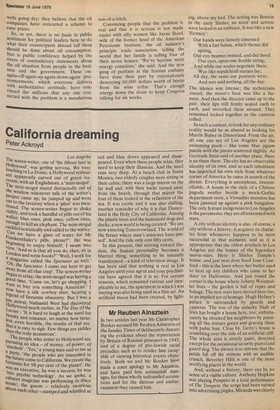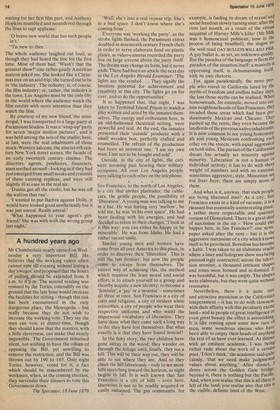California dreaming
Peter Ackroyd
Los Angeles The screen-writer, one of 'the fifteen best in 1-1°IlYwood', was getting nervous. We were lunching in La Dome, a Hollywood restaurant apparently carved out of green icecrearn, with an Englishman, a `mini-mogul'. The mini-mogul stared distractedly out of the window whenever talk of the writer's Project came up; he jumped up and went Out to the lavatory when a 'pilot' was mentioned. The screen-writer began to shake visibly, and took a handful of pills out of his wallet: blue ones, pink ones, yellow ones, enough to kilt an elephant. The mini-mogul cackled ecstatically and called to the waiter: Can we have a glass of water for Mr Prankenthaler's pills, please?'. He was beginning to enjoy himself; I swam into v,lew. `And so is that all you do, then, sit in London and write books?"W ell, I work for ,ars/nagazine called the Spectator as well.' `-'h, the Spectator I came out here to get Lawny from all that crap'. The screen-writer began to relax; the mini-mogul was having a good time 'Come on, let's go shopping. I want to buy you something American.' I ,now have a silk cowboy shirt, bearing a legend of fiersome obscenity. But I was a late arrival; Nathaniel West had discovered nollYwood much earlier, in The Day of the Locust : 'It is hard to laugh at the need for ,beauty and romance, no matter how tasteless, even horrible, the results of that are. But n is easy to sigh. Few things are sadder than the truly monstrous'. Tile people who come to Hollywood are pursuing an idea — of money, of power, of stardom'. 'Yes,' a young man said to me at a Party, `the people who are interested in the future come to California. We create the fantasies for 98 per cent of the planet'. He Was an executive, he was a success, he was 'into psychic technology'. As we spoke, a cabaret magician was performing to disco Music; the guests — relatively incurious about each other — stamped and whistled as red and blue doves appeared and disappeared. Even when these people relax, they need to keep their illusions. And the need runs very deep. At a beach club in Santa Monica, two elderly couples were sitting in their cabin; there was a large mirror on the far wall and, with their backs turned away from the beach, through that mirror the four of them looked at the reflection of the sea. It Was exotic and it was also chilling, another reminder of why it is that Disneyland is the Holy City of California. Among the plastic trees and the humanoid dogs and ducks, a new world is being created: 'We are now entering Tomorrowland. The world of the future where man's anxieties have passed'. And the ride only cost fifty cents.
In this process, this striving toward illusion, the human personality becomes a blurred thing, something to be instantly transformed — a kind of television image. It has been said that nothing is real in Los Angeles until your agent and your psychiatrist have agreed that it is so. For certain reasons, which remained curious and inexplicable to me, the apartment in which I was staying was also being used as a film set. An artificial moon had been created, by light ing, above my bed. The setting was Boston in the early Sixties; an actor and actress were locked in an embrace. It was like a new `Eestacy': Our hands were firmely cimented With a fast balme, which thence did spring, Our eye-beames twisted, and did thred Our eyes, upon one double string; And while our soules negotiate there, Wee like sepulchrall statues lay; All day, the same our postures were, And wee said nothing, all the day.
The silence was intense; the technicians stared; the moon's heat was like a furnace. And then the director came up to the pair, their lips still firmly sealed each to each, and swivelled them around. They remained locked together as the cameras rolled.
In such a context, to look for any ordinary reality would be as absurd as looking for Martin Buber in Disneyland. From the air, all one can see of Los Angeles are the swimming pools — like some blue jigsaw puzzle with the pieces scattered slightly. As Gertrude Stein said of another place, there is no there there. The city has no observable identity of its own, and so each inhabitant has imported his own style from whatever corner of America he came in search of the dream. Everything is amorphous, irreconciliable. A house in the style of a Chinese pagoda nestles beside a mock-Gothic department store, a Versailles mansion has been jammed up against a pink bungalow. The only feature indigenous to Los Angeles is the pavements: they are all encrusted with stars.
A city with no identity is also, of course, a city without a history; it acquires its character from whomever happens to be most successful at that moment, and so it is appropriate that the oldest artefacts in Los Angeles are the homes of the legendary movie-stars. Here is Shirley Temple's house, and just next door lived Joan CraWford — this is the lawn where her butler used to beat up any children who came to her door on Halloween. And just round the corner is the house where Johnny Weismuller lives — the garden is full of ropes and foliage. The new stars have moved here too, in an implicit act of homage. Hugh Hefner's palace is surrounded by guards and cameras. The son of the unlucky Shah of Iran has bought a house here, too; unfortunately he shocked his neighbours by painting all the statues green and gracing them with pubic hair. Close by, Getty's house is crumbling over the side of an artificial cliff. The whole area is utterly quiet, deserted except for the occasional security patrol and guard dog. The silence is so intense that the petals fall off the mimosa with an audible crunch. Beverley Hills is one of the most terrifying places in the world.
And, without a history, there can be no sense of a viable culture. Anthony Hopkins was playing Prospero in a local performance of The Tempest; the songs had been turned into advertising jingles, Miranda was clearly waiting for her first film part, and Anthony Hopkins mumbled and meandered through the lines to rapt applause: '0 brave new world that has such people in't.'
"Tis new to thee.' • The whole audience laughed out loud, as though they had heard the line for the first time. Most of them had. 'Wasn't that the greatest show?' one rather gaudy American matron asked me. She looked like a Christmas tree on an acid trip; she turned out to be in 'the industry'. The industry, is, of course, the film industry; or, rather, the industry is the town. Los Angeles must be the only city in the world where the audience watch the film credits with more attention than they watch the film.
By courtesy of my new friend, the minimogul, I was transported to a large party at Paramount Studios. It was a `wrap-up' party for seven 'major motion pictures', and it was held among the sets of the studio; here, at last, were the real inhabitants of those mock-Western saloons, the nineteenth century New York street scenes, the facade of an early twentieth century cinema. The directors, agents, producers, financiers, stars seethed around — looking as if they had just emerged from small nooks and crannies of these cunning replicas, and were still slightly ill at ease in the real air.
'Dustin got all the credit, but he was off the wall on that one'.
'I wanted to put Barbra against Dolly, it would have looked good aesthetically but it was just unreal. Really unreal.'
'What happened to your agent's girlfriend? She was with with the wrong group last night.'



































 Previous page
Previous page